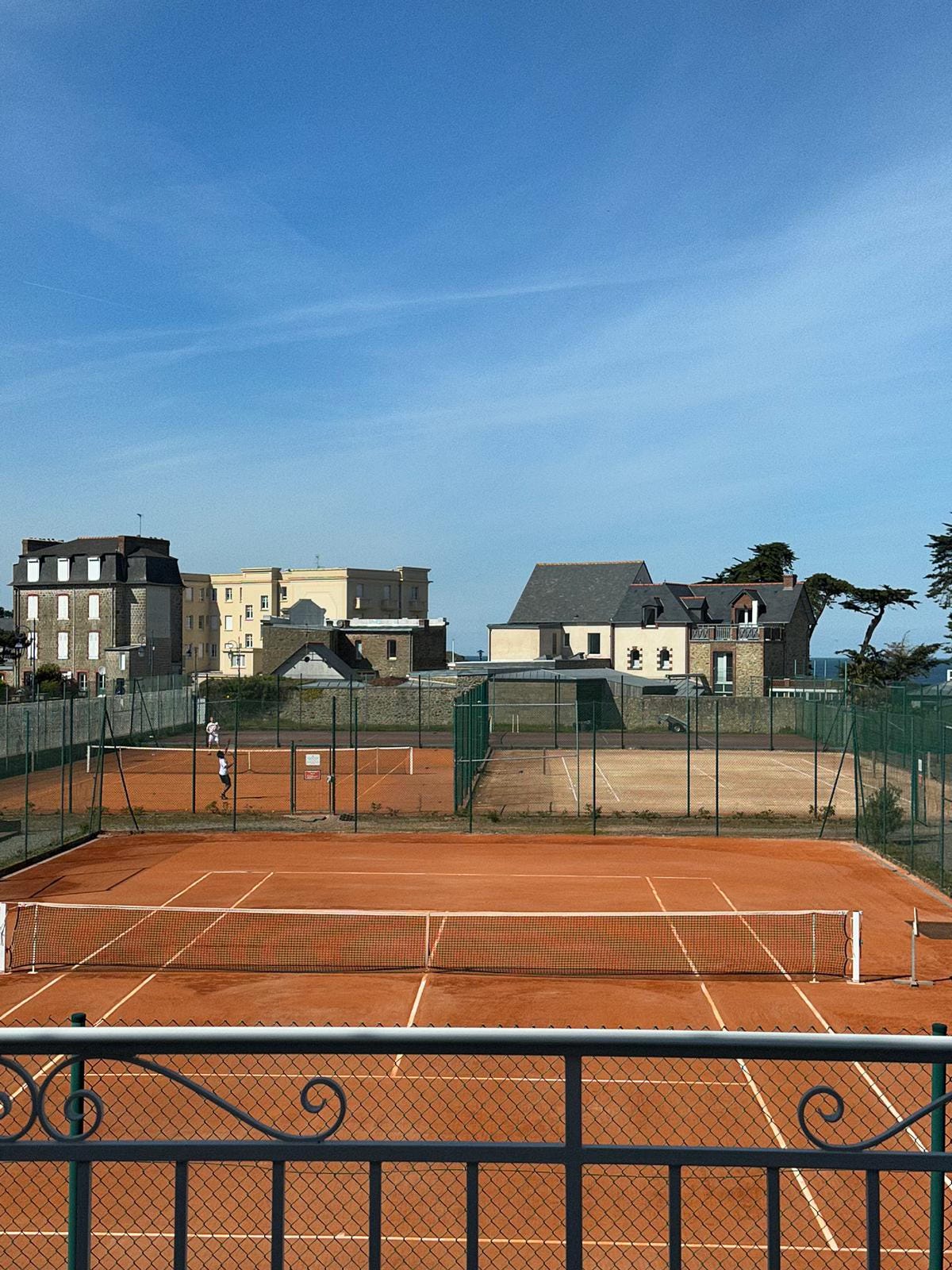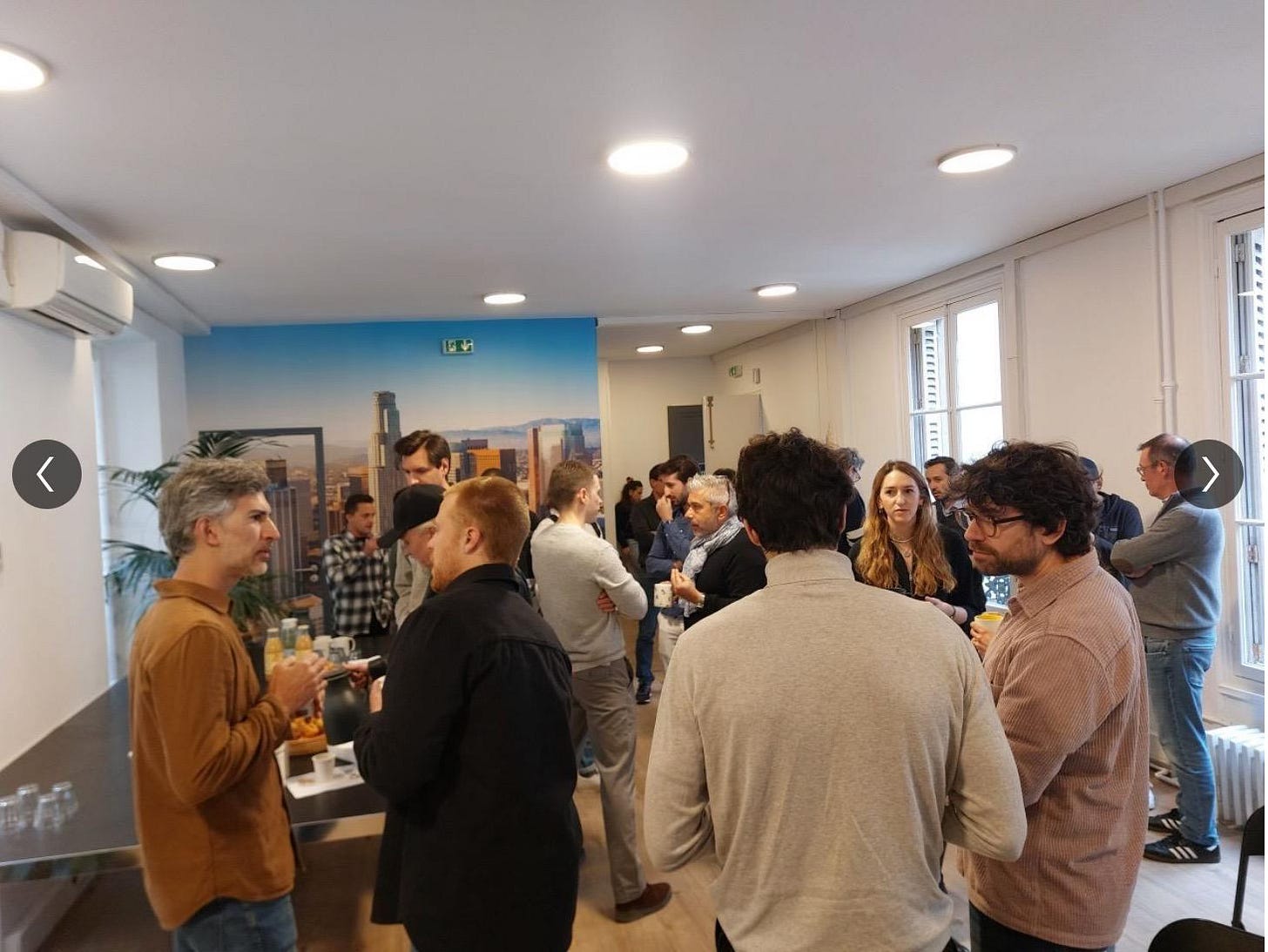Slow Change Is Hard, But Still Change
The kind of progress no one claps for, but that matters the most.
Walking out of physical therapy this week, I was thinking about how the work that changes you most doesn't usually feel like progress while you're doing it.
Last week, I picked up a tennis racquet for the first time in months. I treated myself to only 10 minutes before I had to stop—both out of caution and also because I knew my strength wasn’t back yet enough to play how I wanted to. I finished the session left-handed, laughing at how bad I was with my non-dominant hand, but also grateful to be out there at all.
Since last April, I’ve been dealing with a shoulder injury. I’ve received two cortisone injections for it—one in November for bursitis, another in January for an inflamed AC joint previously cloaked by the bursitis pain. I’ve been going to PT weekly before, during, and after.
Getting back on the court was a milestone for me. It made me emotional and proud—even if I had to ice it and slather it with anti-inflammatory gel afterward. And even now, writing this over breakfast, I feel tears welling up. Because it’s not as much progress as I want.
All I want is to be able to play at full force again.
There are goals and then there are goals
I want to talk about this in the context of goal-setting and progress.
Because of the self-help and wellness economy, we’re encouraged to make a lot of small cosmetic changes. We’re encouraged to drink more water, wake up earlier, scroll less, and apply more sunscreen. These are helpful, but these likely aren’t the truly difficult changes that challenge your identity and really make you slog through mud to get to a better place long-term.
I’ve been thinking about this while listening to The Mountain Is You by Brianna Wiest, a currently buzzy self-help book about how people self-sabotage. (We talk about a lot of business and personal growth books at work, so I’m giving it a try on audiobook.)
There’s a section where she talks about how most of us imagine that change is like flipping a light switch. One day you're stuck; the next day you’re free!
But real change is dozens of tiny shifts and attempts, stacked on top of each other with periodic measurement. Invisible for a long time. Hardly noticeable even to yourself. Until somehow, you're not stuck in the same way anymore.
That description landed as I was listening to the book passage while walking from PT to work this week.
The work of rehabilitating an injury or tackling any number of other thornier topics is more two steps forward, three steps back, and feels like nothing is happening until it doesn’t.
It’s also why, at the start of this year, I decided to set a few big resolutions that would genuinely improve my life but weren’t very glamorous.

At the beginning of the year, here’s what I wrote down:
Heal my shoulder injury so I can play tennis and swim again
Be less defensive in hard conversations, and ask for help earlier
Build my VO₂ max through steady Zone 2 cardio and Zone 5 max days
Say no to social plans when I’m depleted
Take up more space and confidence in my body and presence (more to come on that when I write about everything related to wedding dress shopping)
Work on more formal, refined French
Some of these goals are measurable. I wanted to increase my VO₂ max by six points. I wanted to read three short novels in French. Others are less linear but still visible: measured in a conflict that lasts a day instead of a week, or noticing that I’m standing taller in a photo when I look at it weeks later.
But working towards these goals is *frustrating*.
How it actually feels
A few days after that tennis session I mentioned, I had one of my best PT sessions yet. I finally hit a range of motion I hadn’t reached in nearly six months. Half a kilo more weight on a few exercises.
Tiny on paper, but huge to me.
Then over the next weekend, I leaned too hard on the handlebars during a cycling workout and set myself back again. This week’s PT was just massage and mobility, trying to reduce inflammation enough to rebuild.

From the outside, it would be easy to think nothing’s changed. I still can’t lift heavy things with my right side. I still can’t sleep on it. I still have to say no to the sports I love.
But actually, when I’m honest, my baseline has shifted. I’ve made real progress: I feel it when I place a heavy pot back onto a high shelf, carry a suitcase down the metro stairs without wincing, and hold a downward dog without bracing for pain.
Even on frustrating days when I can’t move forward, I’ve still inched forward when I zoom out on a long enough time horizon.
Unfortunately, what I’ve learned is that real progress on difficult challenges is rarely a straight line. Some days I feel worse than I did a few weeks ago. Other days I surprise myself by doing something far beyond my expectations. The unpredictability of it might be the hardest part to stay patient with.
Though, an important caveat: that’s not always the case. Sometimes, actually, you’re making zero progress. Last summer, after three months of pain and PT, I realized my pain was the same. So I pushed for MRIs and a revised plan of action. It led to a new care plan, a new treatment, and a new team. I don’t believe in blindly pushing toward a goal just because you committed to it. There’s a difference between slow progress and spinning your wheels to stay stuck.
Where else it shows up
I’ve also seen this play out over and over again in my work. I’m currently working at a company called Augment, an online business school for entrepreneurs. Our instructors are the founders and CEOs of companies like Waze, Shazam, YouTube, Wikipedia, and Lime. I spend a lot of time talking with our students—mostly business owners who want to scale their existing businesses but also doctors, lawyers, engineers, designers, architects, and more who want to start their first business, median age 41, from all over the world.
A lot of them are waiting for a lightbulb moment. The day when they’ll suddenly feel brave enough, ready enough, sure enough to make a big change or launch the business they’ve been thinking about. They ask “permission questions”—waiting for someone to tell them they’re ready or they’ve gained enough experience to take the next step.
But the ones who actually do it aren’t waiting for the claw machine to pick them up out of this reality and carry them to the next.
They have been quietly watering an idea for months, sometimes years. Tinkering. Testing. Turning it over in their minds without even realizing they’re moving forward, however slowly.
And then one day, they cross a line. Not because someone saved them. Not because they woke up different with a badge that says Successful Founder. But because they stayed close enough to the work to eventually see where it could lead.
Progress doesn’t look very heroic while you’re in it. It barely looks like anything. It often feels like nothing. But it’s movement nonetheless.
Quiet checkpoints
Also, sometimes progress isn’t something you plan or push for. It just shows up one day, and you notice you’re handling something that used to undo you.
Last week, I went to a breakfast hosted by a VC fund, an event entirely in French. (Also, out of around forty attendees, I was one of three women, but that’s another story.)
I used to dread these. Especially the networking part at the beginning: mingling in French over coffee. It’s hard enough to make small talk in a room full of strangers in your native language, let alone in one you’re still learning.
This one was a panel discussion about how startups can expand into the U.S. market. I chatted, held my own, made contacts. I even had a personality! I received no applause for my progress, no “remember the event like this last year when you had to switch to English mid-sentence while trying to describe your primary levers for user growth?” But I knew.
It was a quiet checkpoint. One of those moments that tell you you’re not where you used to be. And you didn’t even notice yourself arriving.
The heavier changes—the ones that affect how I respond to pain or conflict or stress—don’t come quickly. They take time. They demand patience, setbacks, repeated effort, and regular measurement to know you’re not stuck. Honestly, a lot of the time, they still absolutely suck.
The work of changing how you move through the world is rarely dramatic. It’s heavy, like still encountering conflict but recovering faster. It’s boring and tedious, like tiny resistance band rotations for my rotator cuff. It’s invisible for a long time, like the impact of 45- to 60-minute Zone 2 sessions for a half-point increase in VO₂ max.
I don’t have a tidy bow to tie this with. I’m still in it. It still feels hard. And change is still happening anyway.
And not being there yet also means I’m not stuck in the same place anymore either.







Really enjoyed this, especially the quiet checkpoint of recognizing after the fact that you didn't have to switch back to English this time around. Thanks for sharing, and I hope your shoulder injury continues to recover!